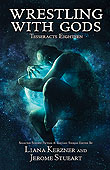I went to a publishing conference in New York some years ago, and an agent said that a great author is a great storyteller. You can have all the craft and technique in the world, but if you aren’t a good storyteller, you won’t become a true success. Alternately, you can have the worst craft and know nothing of technique and be the next huge star of the publishing world. Yet, she could not define what made a good storyteller, like it’s some nebulous thing that cannot be truly understood. She was in the “you can’t learn it, you just have to be born with it” camp, a believer in which I am not.
But what is good storytelling if it’s not the expert use of craft and technique? I’ve been puzzling over it for years and I think I finally figured out a rather large component—a good storyteller is one who can tap into emotion with every word.
We humans, above all else, are creatures of emotion. We like to think we are creatures of intellect and reason and morality, but these things are constructs we’ve created to put limitations and controls over the nasty, hind-brain, instinctual animal side that is human emotion. Emotion motivates us in pretty much everything we do. Our desire to feel happiness, love, safety, pleasure all shape our choices. Our desire to not feel pain, sorrow, grief, all push us to move in a particular direction, even if it’s subconsciouly. Every choice we make is rooted in our emotional health, or lack thereof. Our need to feel one emotion over another.
The crazy thing is, everyone human being past, present, or future feels the same emotions. Emotion is the one, true universal language. It is the one thing we all as a species, share, and no emotion is more familiar to us all than fear. Writing our fear, more than any other emotion, can truly raise a writer’s prose to new heights.
There’s two ways of writing what frightens us, and both are equally beneficial. The first is the obvious definition—if we want our audience to fear something, start with what we, ourselves, are the most afraid of. J.K. Rowling once said that she decided to put giant spiders in the Forbidden Forest in Harry Potter and Chamber of Secrets because she herself was afraid of spiders. Similarly, Peter Jackson’s rendering of Shelob in the Return of the King was built off his personal arachnophobia. Think of it as a mind hack. It’s easier to write what we know, how we personally feel about a particular thing or situation when we write about something that makes us feel the emotion we want to invoke. It’s easy to make spiders terrifying if the author is terrified of the creepy bastards, but harder to make a horse frightening if they make the author all warm and fuzzy on the inside.
It doesn’t necessarily have to be a monster. It can be a fear of rejection, a fear of success, a fear of fear itself. It’s making the fear personal that’s the key, no matter what genre or sub-genre we are writing. Every genre deals with some sort of fear, and the more we make that fear our own, the easier it is to make the reader feel it with us.
The second way of looking at writing what one fears isn’t so obvious, and it’s something we all face at one point or another. It’s taking on those scenes that make us cringe. You know those scenes, the ones that make us uncomfortable or leave us at a loss. Wether its fight scenes or sex scenes or scenes of moral uncertainty, we all have a scene somewhere that tempts us to just skip it and have it happen off screen. After all, the worst fear of any writer is that an important, necessary scene will suck and bring the whole piece down.
But nine times out of ten, that seemingly impossible scene will become one of the more powerful moments in a story. Dan Wells once said that a scene in I Am Not a Serial Killer, where the protagonist draws a knife on his mother, was an especially difficult scene to write, but the final product is one of the most emotionally impactful moments in the book. Alternately, I have a friend who kept skipping over scenes where people were fighting (verbally or physically) because he wasn’t comfortable with violence, but it left his work lacking conflict and the story suffered because of it.
Part of why this is so effective, I think, is that the struggle to get the scene written and fear that it won’t work makes us slow down and take a long, hard look at what we’re doing, much more so than a scene that just plops itself down on the page. Difficult scenes force us to pull out all the stops, to dig deep and give it our all, thereby forcing us to put our best work on the page because anything less would just prolong the torture. Also, fear is conflict, and whether it’s felt by the character or just subconsciously by the author, it puts an edge, an undercurrent in the scene that can lift it above simple prose. It’s always the scenes I didn’t want to write, the ones that kick my ass, that I always end up the most satisfied with, and I think it’s because of the fear. If I wasn’t afraid of what I was writing, the writing would not be as good. Period.
Use the fear, share it. It won’t be easy, but more likely than not, your readers will feel it, and what they feel is what will stay with the reader long after they finish the story.




